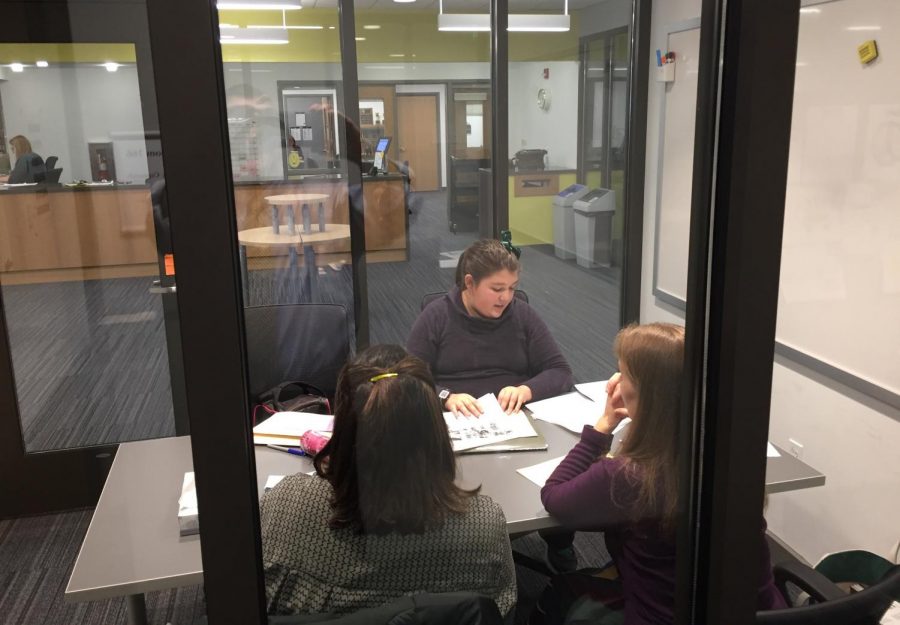Preparing for the Future
February 12, 2018
For the past three years, Head of middle school Jonathan Huxtable and the middle school staff have been working to develop the process by which students reflect upon their progress and growth. In the past, students were simply given an evaluation by their teachers on their report cards. However, through the portfolio process, students are able to be more involved in assessing their own development. Throughout the year they collect work that supports their self-evaluation, which they present to their parents and advisors at the end of each semester first in person, then through writing in the second semester.
During their mid-year portfolio conference, they talk about both their achievements and the areas where they can improve. They also create two to three goals which they agree to work on throughout the second semester. These goals are then brought back at the end of the year and the students evaluate their progress. In addition to this, the students write a reflection which is put at the end of their final report cards.
The current eighth grade class will be concluding their three year journey with a new, challenging assignment called the “Capstone Investigation.” This is similar to the Senior Exploration for the Upper School and the 5th grade Genius Hour. They will be given from December to June to do research into any topic that they desire. They will use the skills that they have learned in Middle School to create a trifold poster which will be publicly displayed outside the theatre at the end of the year. On this poster, they will provide an explanation of how they used the eight outcome objectives to learn about the topic they chose.
The eight outcome skill objectives are: Inquire & Engage, Collaborate, Manage Time & Organize, Be Mindful, Create, Live Responsibly, Grow & Develop Resilience, and Communicate. These objectives are meant to guide the students as they develop their presentations. Throughout the process, the students are asked to stem their presentations off these topics and to think of how they can improve in one of these areas. When asked how he thinks the portfolios will benefit the students, Huxtable answered, “Ultimately, I think it helps remind students that they are the ones truly in control of their learning. They are truly responsible for their own growth. This is a way to illustrate and help recognise what hard work they can do. My hope for everyone in this progress is to grow and change through their hard work.” This process enables students to become more involved in their own development and helps them to visually see their growth throughout the year.
Though the process is meant to help the students, it is generally not well received. One anonymous eighth grader said, “They are very time consuming. I get why we do them, but it’s kind of a waste of time.” To many of the current middle school students, the portfolios take up time that could be better spent doing homework or speaking to teachers. Students argue that they could use this time to actually improve their grades instead of gathering materials to understand why they need to do better.
Starting this year, the high school students are following the middle school’s example by leading parent teacher conferences themselves. When asked about her opinions on the portfolios and her current student teacher conferences, Estelle Hegenbarth ‘21 said, “We already have enough homework and work to do and making people do more work to show your parents is counter-intuitive because you are saying you want to try harder, but writing takes more time that you could be doing homework. I think that what we are doing, writing about it once, is good.” The middle school students put in weeks of preparation whereas the high school students are only asked to spend one long advisory period to answer questions before going into the conference.
Though this process is not universally accepted by the students, many of the parents greeted this innovation with positive comments according to a survey taken after the conference. When asked what the strongest, most important, or memorable part of the conference was, one parent said that the way that their son “directly tied his study habits to his test scores” demonstrated that their son would be able to solve a problem once he understood its cause. Parents don’t often get a chance to see their children in a school environment, so many parents were pleasantly surprised by, as one parent explained, “watching the maturity in my child and having him notice and take responsibility for his success and areas of improvement.” Almost all of the parents who took the survey agreed that they enjoyed seeing their children take responsibility for their actions and presenting their work in a thoughtful and mature way.
Through this three year process, students are able to be more involved in their student development. The goal is for students to develop a better understanding of themselves and develop their self confidence and speaking skills.































